

Marmalade maker and originator of the Marmalashes, Russell Luckock, explains its history:
"Buninyong's challenge to England came about when two events coincided. Firstly, I had taken a jar of my home-made marmalade as a gift to some English friends, one of whom I know is a keen marmalade-maker using their family's long-cherished recipe. In due course I received a not totally flattering report from the marmaladier's wife. So, as a joke, I suggested that, in order to negate wifely bias, we each submit a jar for independent adjudication at the International Marmalade Awards held annually at Dalemain House in Cumbria. After all, there is a great deal of pride at stake amongst marmalade-makers!
At about the same time, Australia lost the Ashes to an English cricket Eleven. Such a loss is a serious and easily diagnosable Australian malady that can only be cured by subsequent success some summers hence.
Question: What to do?
Answer: Challenge the Poms to something else that that they claim to have invented in a classic England-Australia Test!
Hence a challenge was issued - and accepted by England.
Forthwith Eleven jars of Buninyong's best marmalade, plus 12th jar, were despatched to Cumbria - and the Test was conducted in the stately and historic Dalemain House in February, 2011.
We Australians, although historically concerned about the possibility of bias in sending our best to be judged in England, were confident that the good people at the International Marmalade Awards could be entrusted with the task of judging this important Test with the absolute neutrality of a 'Dickie' Bird or a Simon Taufel. Certainly, we felt safe in the knowledge that the close proximity of the Scottish border to Cumbria should diminish any English bias towards their own!
Indeed, Mrs Jane Hasell-McCosh, founder of the Marmalade Awards, went to great lengths to assure us of the integrity of the judging in her delightful description of the process that took place in the oak-panelled dining room at Dalemain House. The judging panel comprised two Antipodeans, a member of the Worshipful Company of Fruiterers (incorporated by Royal Charter in 1608) and a local Member of Parliament. All overseen by the third umpire, a lady from the Cumbrian Women's Institute; "an organisation purer than the cleanest whites"!
Now how could we, as mere colonials with conviction, possibly complain about the neutrality, integrity and Persil whiteness of that!? And furthermore, the score attested to the judges' neutrality with Buninyong - and Australia - the victors after a "fiercely fought" affair.
So the stage was set for the next classic Australia v England Test in February 2012, and for many years to come."
The history of marmalade is eloquently explained by Dan Lepard on the Marmalade Awards website at:
The history of marmalade

The Buninyong Eleven - 2011